by Hanna Roberts | Oct 23, 2017 | Academics, Current Students, Human Resource Management, Uncategorized
Last week, eleven COBA students attended the HRSouthwest Conference (HRSWC) in Fort Worth, TX. The HRSWC is the largest regional educational and networking event for human resource professionals. HRSWC is organized by DallasHR, the Dallas-based SHRM Affiliate Chapter. More than 2,500 HR professionals attended the conference and had the opportunity to hear from keynote speakers Laura Bush and John O’Leary, attend educational sessions, and connect with other professionals as well as experience new ideas and technology in the HRSWC Marketplace.
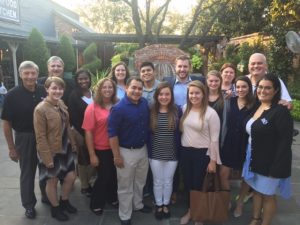
Dr. Malcom Coco, Dr. Phil Vardiman, and students at the HRSWC.
Society of Human Resource Management Sponsor Dr. Malcom Coco said the conference “was an awesome opportunity for the eleven attending students to meet and network with the conference attendees”. This conference provided an opportunity for the students to learn more about their discipline. It also helped them to determine if they wanted to go into the HR field, what part of the field interested them, and gave them an opportunity to meet hundreds of HR professionals to expand their individual network for possible future jobs.
Tom Harris, a senior management major and full-time manager at The Men’s Wearhouse, was encouraged by Dr. Phil Vardiman to attend the conference so that he could connect with HR professionals. Harris said that his conversation with Linda Swindling was the standout of his conference experience. Swindling is a Certified Speaking Professional, “Recovering Attorney,” the past-president of the National Speaker Association, the current President of Journey On!, her own speaking and consulting company, and the author of more than 20 books. Harris talked with her at length before Swindling’s presentation about her history and experiences and was even called on stage during her presentation to share a few words. Harris said that the most helpful thing he learned at the conference was the importance of being intentional. Their full schedules during the conference required some creativity on his part so that he could connect with people. “If someone I wanted to talk to was in a hurry to get to a speaking session, I would try my best to be in a hurry with them,” he said. “Have your main course at one table, meet everyone that is sitting near you, shake their hands, and go get your dessert and do the same thing at a different table.” Harris believes that it is important to take advantage of every possible networking opportunity and felt that the HRSWC allowed him to do this and to practice his networking skills.
by Hanna Roberts | Oct 4, 2017 | Academics, City of Abilene, COBA Events, Distinguished Speakers Series, Faith Infusion, Special Speakers
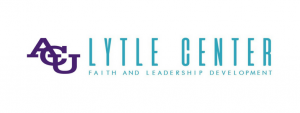 The Lytle Center for Faith and Leadership Development is an emerging organization within COBA. The mission of the Lytle Center is to challenge individuals to wholeheartedly follow Christ, equipping them to be leaders of integrity at home, work and in their community. The Lytle Center holds weekly chapel for students, with guest speakers from a variety of backgrounds who come speak to students about the ways in which they enact their faith in their leadership roles and how students can do the same. This semester, Lytle Center Chapel has had the pleasure of welcoming guests like Anthony Williams, the mayor of Abilene, who encouraged students to have the courage to get out of their comfort zones and face the issues before them in order to lead well.
The Lytle Center for Faith and Leadership Development is an emerging organization within COBA. The mission of the Lytle Center is to challenge individuals to wholeheartedly follow Christ, equipping them to be leaders of integrity at home, work and in their community. The Lytle Center holds weekly chapel for students, with guest speakers from a variety of backgrounds who come speak to students about the ways in which they enact their faith in their leadership roles and how students can do the same. This semester, Lytle Center Chapel has had the pleasure of welcoming guests like Anthony Williams, the mayor of Abilene, who encouraged students to have the courage to get out of their comfort zones and face the issues before them in order to lead well.
Students have enjoyed learning from community leaders and being able to participate in the founding and forming of the Lytle Center. A student-run Advisory Board meets once a month to talk about the progress of the Lytle Center, to brainstorm new ideas, and to strategize how goals for the Center can be reached. We think that the student involvement is key; their help in structuring the center is essential to establishing the value and utility students will receive by involvement. The Lytle Center wants students of all majors – not just business – to become involved. A significant part of the foundation and forming of the Lytle Center has focused on how leadership extends beyond the business world. The Lytle Center believes that all students, regardless of major or career path, need to have the tools to lead in an effective, Christ-like manner. We look forward to seeing increased participation with students all over ACU’s campus.
The Lytle Center has become the point organization for many of COBA’s pre-existing leadership programs, uniting them under one body. Now in its 20th year, Leadership Summit is being planned within the Lytle Center, with guests like 2014 Time Person of the Year, Kent Brantley and President of Kellogg U.S. Specialty Channels, Wendy Davidson, scheduled to speak at the January short-course held in Colorado. Additionally, the Lytle Center is home to the Distinguished Speaker Series, which brings in Fortune 500 executives from around the country to speak to students about Christian business leadership perspectives they have learned through trial and error in their own careers.
The Lytle Center is working to form small groups for students who are interested in being mentored by older peers and ACU faculty and staff. The center is also working with churches around the city of Abilene to get students more involved in college ministries. The Lytle Center is in the early stages of exploring and planning a week-long service project for Spring Break to South Texas to help relief efforts for the victims of Hurricane Harvey. The service trip will be open for all students to participate.
We are excited to see what the Lytle Center will become and where it will take our students. We envision a new generation of leaders coming forth from involvement with the Lytle Center who rely on their faith to be effective in their communities. Keep up to date with the Lytle Center as it grows and develops by liking the Facebook page and watch for events like Leadership Summit and Distinguished Speaker Series for a chance to get involved. You can learn more by going to their blog: http://blogs.acu.edu/lytlecenter/
“Whatever you do, work at it with all your heart, as working for the Lord, not for human masters.”
Colossians 3:23
by Hanna Roberts | Sep 18, 2017 | Academics, COBA Events, Poverty and Development, Social Entrepreneurship, Student Spotlights, Uncategorized
Casey McMullin is a senior financial management major from Colorado Springs, Colorado. This summer, Casey traveled around the world interning and studying abroad. He visited countries in Africa and Asia. Casey returned to Abilene with a changed perspective, new skills, and many stories.
Q: Where did you go and what did you do in Africa?
A: I went to Arusha, Tanzania. It was two hours from Mt. Kilimanjaro, which was amazing to see every morning when we woke up. We were based at Neema Village, where they house 40 babies and at-risk or abandoned children. I helped start a microfinance program so that local mothers can start businesses for additional income.
-

-
Casey with children in Neema Village
-

-
Casey with a child in Tanzania.
Q: Did working with microfinance in Tanzania change your perspective on business?
A: I think that the most challenging part was the difference between Tanzanian and American business and legal environments. When we were building the microfinance program, we had to do everything in accordance with American not-for-profit laws and Tanzanian laws so that they could get loans. A better understanding of business law would have helped.
The nature of business was very different in Tanzania. It was very simple. I had to go back to the foundations and teach the locals so that they could understand what we were doing. At the same time, I had to maintain the financial complexities I had learned so as to ensure that the program would function properly and long past our departure.
Q: What was the most impactful interaction you had with a local?
A: I think that the coolest thing that happened to me happened at the very end of our time in Africa. We only did one test run of a business since it took a long time to set up. We were working with a woman who started a chicken business. We helped her get funding for a bigger coop, food, and medicine for the chickens. On our last day, we were saying goodbye and hugging her. She gave us eggs and then ran to chop down her whole sugar cane. We told her not to, but she cut it down regardless and gave it to us as a thank you.
-

-
Casey and Lexi Koon, junior, with the woman who started a chicken business.
-
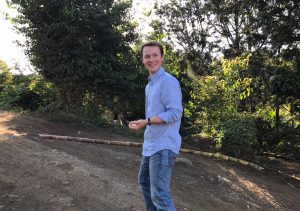
-
Casey with the sugar cane that the woman gave in gratitude.
Q: Where did you go and what did you do in China?
A: We were based in Shanghai and also traveled to Beijing and Hong Kong on the weekends. I took a crash course in basic principles of entrepreneurship and Chinese principles of entrepreneurship. We examined
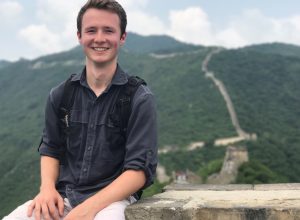
Casey sitting on the Great Wall of China.
the different opportunities to and ways of starting a company in China, visited start-ups, and talked with a number of entrepreneurs, both natives, and expatriates.
Q: What was different about studying business in another country?
A: One thing that struck me was the sheer size of China. The massive populations changed the way they did business in ways I didn’t think about. It was also interesting to see similar priorities between us as well as what each country values more. For example, the Chinese emphasize education starting at a young age and it was interesting to see how that affected business and the way people were.
Q: Did you have a big culture shock moment?
A: Oh yeah. After spending 8 weeks in Africa where there are no Chinese people, we were shocked as soon as we stepped off the plane. There were so many people walking around and they all seemed so busy. There was a class of 30 kids running around and yelling at each other in Chinese and the only thing we could think was “we are in China.”
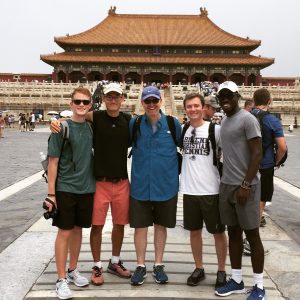
Nicholas Weirzbach, Steven Yang, Dr. Andrew Little, Casey, and Jack Oduro smile in front of the Forbidden City.
Q: Compared to interning, how was study abroad different when it came to cultural immersion?
A: In Africa, I felt like I needed to immerse myself a lot more. I think that this was because I was there to help other people rather than studying for my own benefit. Being there for others drove me to learn the language and immerse myself more since I was not there for myself.
Q: Overall, what was your biggest takeaway from this summer?
A: Take any risk. This summer, I saw just how much people live with nothing. I think that the fear of losing something can hold people back, but that is a mindset that you just can’t live with. You should be doing what you love. Look for an outcome rather than a consequence.
by M. C. Jennings | Sep 6, 2017 | Academics, Careers In..., COBA Staff, Current Students, MAcc, Outcomes, Placement stories, Uncategorized
Aimee Agee is COBA’s Professional Development Manager for Business and Technology students. She works continuously with students to equip them with the skills and knowledge to successfully launch into the professional world. This includes meeting one-on-one with students to discuss their job and internship opportunities and outcomes, connecting them with employers who fit their skills and needs, and analyzing data on each student graduating while remaining in contact with them in their post-grad life. Aimee also conducts class insertions where she discusses specific careers with employers as well as more general information about interviews, resumes, networking, and more. Agee supplied the coaching and leadership needed to help COBA’s business and technology students improve their outcomes this year. Her hard work and excellence in developing and communicating with students has impacted COBA graduates’ academic and professional careers positively.

Aimee Agee
We are pleased to announce that the B.B.A. programs’ overall outcomes have moved beyond our stated goal of 90%. 93% of our May graduating class received either a job offer or an acceptance into a graduate program within ninety days of graduation. Achieving this rate gives us a past-four-year average of 90.18 %. The average starting salary for our B.B.A. students was $41,497. The School of Information and Technology had a very strong bump in employment, especially from Digital Entertainment Technology graduates. SITC had a 100% outcome rate of students with a job offer or acceptance to a graduate program. This includes their international students and again exceeds the target of 90%. The average starting salary for SITC graduates was $57,600. COBA saw 100% of the students in the Master of Accountancy program employed within ninety days of graduation. The average starting salary for MAcc graduates was $55,000.
Learn more about COBA’s Professional Development Program for current students and alumni at the links listed or by going to www.acu.edu/coba.
by M. C. Jennings | Sep 5, 2017 | Academics, COBA Faculty, Current Students, School of Information Technology and Computing, Uncategorized

Rich Tanner
COBA would like to welcome Rich Tanner, new Clinical Professor of Digital Entertainment. Rich has taught for the School of Information Technology and Computing part-time for the past several years and will now be working with technology students on a full-time basis. Tanner has an A.A.S. in Computer Graphics and Programming from Missouri State University, a B.S. in Information Technology with a Concentration in Graphics and Game Development from Abilene Christian University, and a M.S. in Human Computer Interaction from Iowa State University. Rich was contracted as an iOS Developer and Consultant for the KAART Group, was contracted to develop a number of mobile applications for ACU, and worked as a Mobile and Senior Software Developer for USAA. Tanner teaches 3D Modeling, Animation, Mobile Application Development, Game Asset Creation and Texturing, and Character Creation in Maya, Photoshop, and Unity. Tanner brings skills and ingenuity to his classes that will instruct and develop technology students in new and exciting ways.
What do you teach at ACU?
The cool stuff! As a DET faculty, I get to teach 3D Modeling, Animation, and Mobile Application Development (a CS course).
What committees/other duties do you have at ACU aside from teaching?
I have been assigned as a Developer Mentor for Wildcat Software, our student run software company.
What drew you to teaching? Why did you want to work with students?
It’s what I do! Even at USAA, I often found myself drawn to roles where I could teach and mentor new employees and interns. My wife and I also spent 3 years as Youth Ministers while we were in Plano, and I’ve been practicing my teaching on my own children for the past 19+ years. I love seeing people get excited about new ideas and material, and helping people realize their potential. Plus, I just generally get excited about the kinds of things that I get to teach! It’s only natural to share that excitement with a room full of people.
Outside of teaching, what passions and hobbies do you have?
Obviously, I enjoy spending time with my family. My wife and I have been married for almost 21 years, and we have four children. Richelle, who is 19, is a new transfer student to ACU, studying Elementary Education. Kira is 15 and goes to Abilene High. Xandra is 12 and is a student at Craig Middle School. And Connor, who is 7, goes to Bonham Elementary. Connor is the only boy, and was born here in Abilene right before I graduated from ACU. We all enjoy watching lots of movies together and playing various games. I spend my free time (when I have any) working on home renovations, playing video games (usually single player adventures), and doing lots and lots of reading.
by M. C. Jennings | Aug 2, 2017 | Academics, Careers In..., Current Students, Student Spotlights, Student Spotlights, Uncategorized
Brandon Gonzales is a senior Accounting major from Rowlett, Texas. He is interning with Concho Resources this summer.
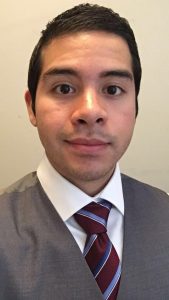
Brandon Gonzales
Q: What have you done in your internship so far?
I am currently interning at Concho Resources which is an oil and gas E&P company based in Midland, Texas. As an accounting intern, I was placed in the revenue department where I was assigned a summer project that I worked on throughout the internship. My project was to perform a self-audit of the severance taxes for oil and gas that Concho paid for its New Mexico wells. If you intern at Concho, you will be assigned a major project associated with the department you are placed in at the start of the summer. At the conclusion of the internship, you will lead a presentation over the results of your project to the upper-management of the company. Due to its importance, my first month of the summer was solely dedicated to working closely with my mentor on this project. This is because each project is over an issue that Concho has an interest in and a majority of the work done by the interns are put to use by the company. For example, the workbook that I created for my project can be directly adapted for future use by the revenue department in performing audits for years outside of the scope I was assigned. After the first month, I was rotated for the remainder of the summer among other departments and groups so I could get more exposure to accounting in the company. I moved to another floor and started working alongside the Director of Accounting and a senior accountant where I helped analyze reserve reports that we received over our properties. My main job on that project was to identify and represent key information that they wanted to review in a future meeting. I created a number of pivot tables and other charts compiled from the data in reports. After a few days, I was moved once again and began working in the Joint-Interest Billing department. There I performed another audit, but this time it was over joint operating agreements that we had from previous years. I was tasked with researching each agreement to determine if we were correctly paying what the contract stated by comparing what we had in our records. Currently, I am still in the JIB department, but am now working with another group to review unbilled properties and the accompanying invoices to determine if they are correctly billed in the revenue system we use.
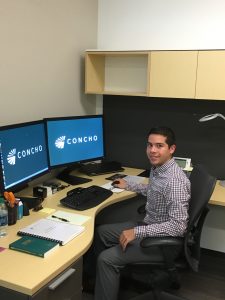
Q: What has been your favorite part of the internship?
My favorite part of the internship so far must be how involved Concho is in making sure the intern class is enjoying the summer in Midland. They want to be sure that we come away from this internship with positive memories of not only the company, but the city as well. There were multiple events throughout the summer that Concho orchestrated for the interns to get together and everything was always paid for by the company. From minor league baseball games in the company’s private box suite to golfing at the country club. They even sent us to Midland’s Petroleum Museum for a day of training so the interns could get a better sense of the oil and gas industry. The coolest event being a field trip out to one of the oil rigs where we received a personal tour from one of the supervisors. Concho also provided summer housing for the interns which really helped in bringing everyone together since we all literally lived doors down from each other. Even when there was not a company sponsored event, the interns usually had something planned like a cookout at the apartment pool.
Q: How do you see this experience aiding you in the future?
Going into this internship, I knew nothing about the oil and gas industry including how accounting was done for E&P companies. However, I was never given any busy work this summer. All the projects I worked on were assignments that would be given to the regular staff and provided an actual benefit to the company. Being treated as another new-hire was worthwhile and the knowledge that I gained can easily be leveraged in the future if I decide to pursue a career in the industry. Getting to know the people I worked with was one of the biggest benefits that I gained from this internship. I’ve built relationships with multiple people over the summer who gave me guidance not only in my career, but life as well. In particular, one coworker welcomed me into her church and got me connected with the youth group she ran. Even if I never work at Concho or in the oil and gas industry, building relationships with more experienced people in the field was a great experience.
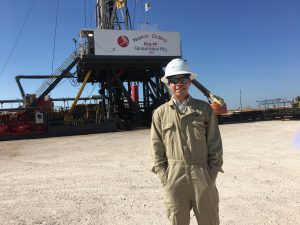
Q: What has grown you as an individual the most in this internship?
I’ve always been the type of person who likes to figure out solutions to problems I come across on my own. With this internship, I had to learn to be more proactive in asking for assistance from not only those who I worked directly with, but others within the company. I knew almost nothing whenever I started a new project and at times that was daunting. Repeatedly needing to ask for further explanations was something that I was uncomfortable with because I didn’t want to be a bother. Over time, I came to realize that being given more responsibilities didn’t mean that I had to bear everything alone. Looking around the office, I noticed that it was common to see people collaborating on their work. Although people had separate responsibilities, we were all part of the same team. This environment helped me get used to working as a part of a larger team and not be afraid to ask for further clarification on what I was doing. People welcomed questions because they wanted to make sure I understood not only how something was done, but the why as well.
Q: Do you have any tips for others?
Audit or Tax? Big 4 or mid-tier firm? These are common questions that accounting majors come across at some point in undergrad. Some students find their own answer within weeks, while others are unsure up until graduation. However, when it comes to starting their career, I think that many accounting students are too quick to dismiss starting out their career in an industry role. Going into public accounting straight out of college is seen as the traditional route with securing a great job in industry after years of experience as the end goal. I think this is due in large part to the fact that many of the companies that recruit on campus are public firms. There is little exposure to any other option before graduation. This summer, many of the staff that I worked alongside did do not come from public backgrounds and I was curious as to why. I received various answers, but the most common was that the long-term goals they had for themselves were perfectly attainable without going into public accounting. The main takeaway being that both routes have their pros and cons so it is up to the individual to decide which path is best for them. I would encourage younger students to equally give both options their attention as they go through college. Choosing to dismiss one side without the proper due diligence is simply closing off a number of future opportunities.

 The Lytle Center for Faith and Leadership Development is an emerging organization within COBA. The mission of the Lytle Center is to challenge individuals to wholeheartedly follow Christ, equipping them to be leaders of integrity at home, work and in their community. The Lytle Center holds weekly chapel for students, with guest speakers from a variety of backgrounds who come speak to students about the ways in which they enact their faith in their leadership roles and how students can do the same. This semester, Lytle Center Chapel has had the pleasure of welcoming guests like Anthony Williams, the mayor of Abilene, who encouraged students to have the courage to get out of their comfort zones and face the issues before them in order to lead well.
The Lytle Center for Faith and Leadership Development is an emerging organization within COBA. The mission of the Lytle Center is to challenge individuals to wholeheartedly follow Christ, equipping them to be leaders of integrity at home, work and in their community. The Lytle Center holds weekly chapel for students, with guest speakers from a variety of backgrounds who come speak to students about the ways in which they enact their faith in their leadership roles and how students can do the same. This semester, Lytle Center Chapel has had the pleasure of welcoming guests like Anthony Williams, the mayor of Abilene, who encouraged students to have the courage to get out of their comfort zones and face the issues before them in order to lead well.









